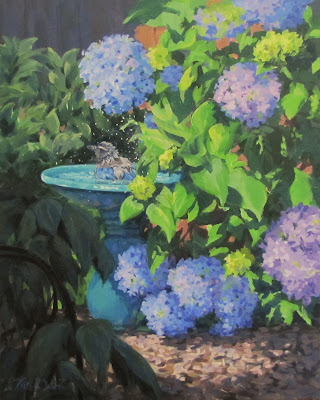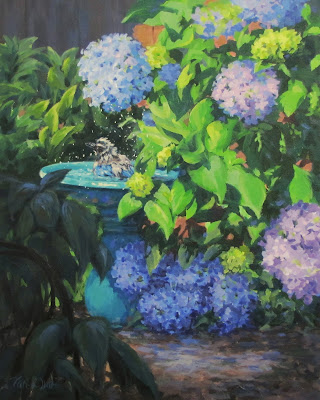If you are like me, the minute I finish a painting I want to share it. I don't get a lot of interest from my cat or my husband. I can't blame them, they have seen a lot of my paintings!
So I put it out on the internet, and then I look at it for a few days. I really need to learn to look at it for a few days first :D Because I usually go in and change something!
I set the painting where I can see it through the day. Just glances while I'm thinking of something else. And I take little notes about what is bothering me.
So here is my recent painting "Birdbath and Blossoms". I was pretty happy with how it turned out.
I tend to stick pretty close to the reference when I'm painting. But, I do try to adjust things to suit my composition and to try to express my personal reaction to the scene.
Identifying the focal point and the light source and direction are really key.
I knew I wanted the scrub jay to be my focal point. So I wanted to create higher contrast in that area, and use the background to create some lines leading to him.
The secondary focal point is the beautiful Hydrangeas.
So here is what the reference photo looked like:
I think you can see the changes I made -
The bird is a bit bigger to make him more obvious, and I used higher contrast and more detail in this area.
The color in the hydrangea is more saturated
The bush to the left in the background is darker to push it back further and bring more attention to the bird.
I simplified and darkened the ground to make it less obvious. Especially behind the foreground shadowed plant. I didn't want that high contrast of the leaves against the lit ground to draw attention and lead the eye right out of the painting.
I darkened the light on the base of the birdbath and simplified the pattern. Again, to not have this area compete with the top of the bath where the bird is. Even though I liked the patterns they made - edit, edit edit!
So with those things in mind, I painted. Now comes the important part. Set the reference photo aside! Don't look at it any more! Just look at the painting itself and let it speak to you as a painting, not a photo. So after the cool down these are the things bugging me. Let's see if they are the things that strike you, too.
1. The area of the flowers near the ground, and the light and texture on the ground are really drawing my eye and competing with the focal area. Especially the ground texture. My eye is jumping back and forth from the bird to the ground.
2. The bird is facing toward the edge of the painting. Leading our eye out. This is a rookie mistake! Ha! I thought about repainting him facing in, but I don't have enough information about the right side of the bird in the photo because it is obscured by the leaves. The other technique when you have a situation like this is to use strong visual stops. Something that blocks your line of sight and leads you back in and around the painting.
3. The leaves and flowers around the bird have more impact than the bird.
4. the edge of the birdbath feels awkward - it feels like it is closer than the shaded leaves in the foreground.
5. There is a lack of integration in the color. Though I've put some reflected light in the shadows of the birdbath, and that's working pretty well, the ground seems unintegrated as do the shadow areas in the leaves.
6. The whole composition feels unbalanced with so much light on the right, dark on the left.
So here is the first version again - next to my revised version, trying to correct these issues:
 1. I've darkened and simplified the ground. It isn't as interesting as before, but now it doesn't compete for attention with the focal point. This is really tough to do sometimes! I liked the texture I'd created quite a bit, but it isn't what this painting is about. I also love to show patches of light on the ground, but again, not the point here. It's so easy to fall in love with an area of your painting that isn't helping the story...
1. I've darkened and simplified the ground. It isn't as interesting as before, but now it doesn't compete for attention with the focal point. This is really tough to do sometimes! I liked the texture I'd created quite a bit, but it isn't what this painting is about. I also love to show patches of light on the ground, but again, not the point here. It's so easy to fall in love with an area of your painting that isn't helping the story...I also darkened the flowers near the ground. Leaving the highest value contrast in the focal area. There is still value shift to show the rounded forms, but the whole value range in now darker.
Do you see how that whole area stays quiet now? It is a supporting character, not competing with the star.
 2. As a stop to the eye, keeping it from following the bird's gaze right out of the painting, I added some light leaves to the bush in the background left. These leaves are also pointing back in toward the bird. I also added one small leaf in the foreground shaded plant. It serves two purposes - one to help lead back to the bird, and the other to push the birdbath back behind it - That was problem #4 above. Do you see how your eye is directed back inward now?
2. As a stop to the eye, keeping it from following the bird's gaze right out of the painting, I added some light leaves to the bush in the background left. These leaves are also pointing back in toward the bird. I also added one small leaf in the foreground shaded plant. It serves two purposes - one to help lead back to the bird, and the other to push the birdbath back behind it - That was problem #4 above. Do you see how your eye is directed back inward now?3. To increase the attention and impact on the bird himself, I increased the contrast. I added lighter highlights and a few spots of darker darks. I also enlarged the darker area behind the bird and added a few more bright water drops against that dark.
4. we covered this with the overlapping leaf.
5. To better integrate the areas of color I added blues and purples to the ground, the leaf shadows as well as the foreground shaded leaves.
6. I think the addition of the light spots in the background bush serve to balance out the light and dark a little more...
So, there it is. Small adjustments that, hopefully improve the painting. I'm happier anyway!
The focal point has taken center stage, my eye moves around the painting instead of out and the whole image seems to be less flat and more 3 dimensional.
The Cool Down Period - it can take you to the next level :)


I love your painting Karen and the changes you made really work..Thank you for sharing it with us.
ReplyDeleteYou're welcome Wendy! Glad you enjoyed it!
DeleteWow, what a learning experience this post was. Thank you.
ReplyDeleteThanks! Glad to help Elizabeth!
Deletethanks for the pointers :) and for showing us this lovely painting!
ReplyDeleteYou are very welcome!
DeleteThank you, Karen. I enjoy these reviews and critiques, because you express the "why" so well!
ReplyDeleteThanks KC!
Delete